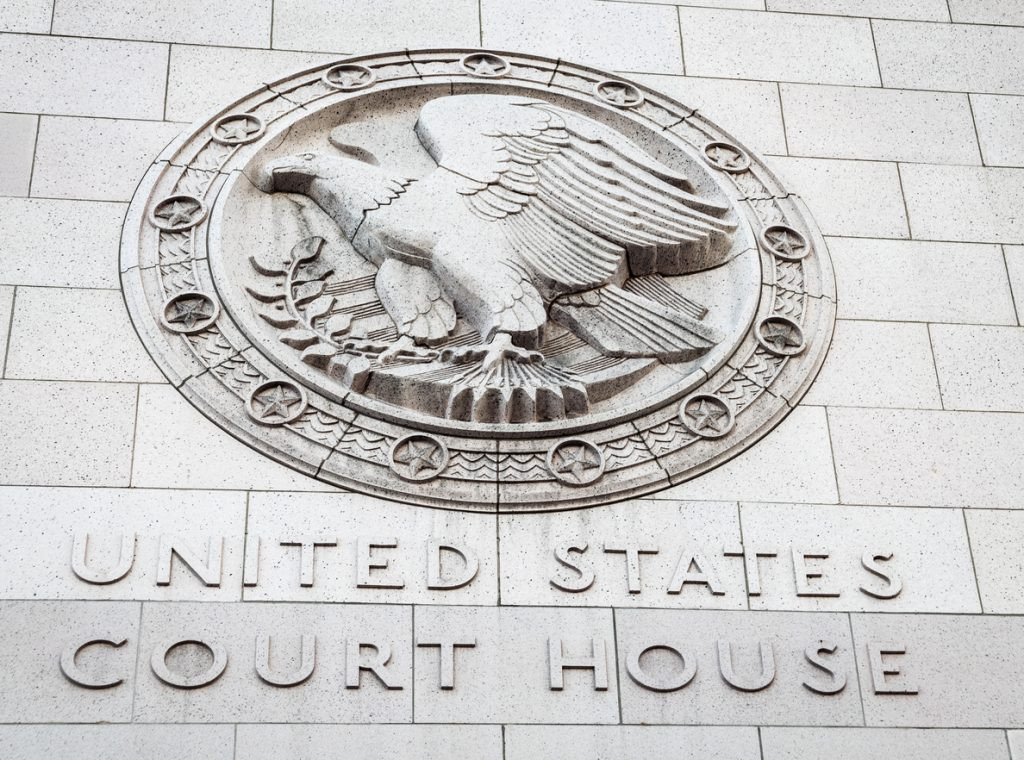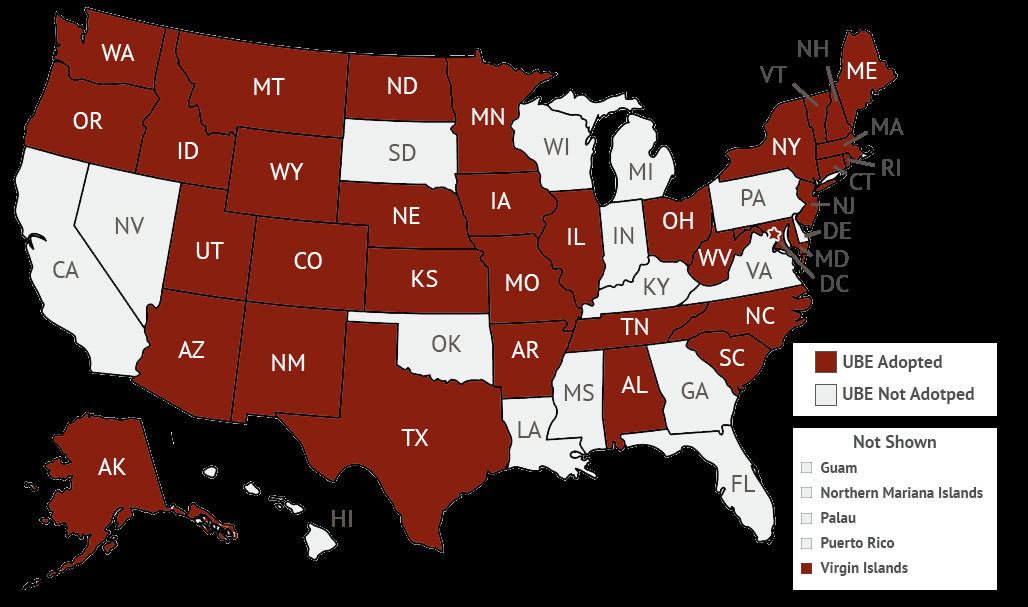 United States Courthouse exterior signifying legal jurisdiction and uniform bar exam relevance
United States Courthouse exterior signifying legal jurisdiction and uniform bar exam relevance
The dream of a national bar exam, championed by legal experts for decades, has seen significant progress with the rise of the Uniform Bar Exam (UBE). As of early 2020, thirty-six jurisdictions have embraced the UBE, either as their primary bar exam or a substantial part of it, with full transitions expected in some areas by 2021. This move marks a significant shift in legal licensure, fostering greater mobility for attorneys across participating states.
UBE jurisdictions share a commitment to administering and grading the bar exam uniformly. Crucially, they mutually recognize UBE scores from other participating jurisdictions. This reciprocity allows candidates who pass the UBE in one jurisdiction to seek licensure in another UBE jurisdiction without retaking the full bar exam, subject to certain time limitations and local requirements. This system offers considerable benefits, reducing the financial burden and lost opportunities for aspiring lawyers, promoting access to justice by lowering barriers to practice, and ensuring a more standardized and reliable assessment of legal competence across participating areas.
Understanding How the Uniform Bar Exam Functions Across Jurisdictions
The UBE’s effectiveness stems from its composition of well-established exam components already in widespread use. Candidates in UBE jurisdictions undergo a comprehensive two-day examination consisting of the Multistate Bar Exam (MBE), the Multistate Essay Exam (MEE), and the Multistate Performance Test (MPT). The MBE utilizes machine scoring for objectivity, while UBE states adhere to national standards for grading the MEE and MPT sections. The National Conference of Bar Examiners (NCBE), the UBE’s creator and advocate, provides extensive training for graders to ensure consistent and fair evaluation across jurisdictions. This standardized grading is fundamental to UBE score portability, as it allows states to confidently accept scores from other jurisdictions when considering candidates for admission. Many argue that this rigorous calibration makes the UBE grading process more reliable than state-specific exams that lack such standardization.
Currently, forty jurisdictions utilize the MBE/MEE/MPT combination in some form, making it the dominant method for evaluating legal competency in the United States. While not all of these jurisdictions formally administer the UBE, their use of these components highlights a general consensus on the core skills needed for legal practice. The primary distinction for states not fully adopting the UBE often lies in their reluctance to embrace the score portability and standardized grading aspects that are central to the UBE framework.
Which Jurisdictions Currently Utilize the Uniform Bar Exam?
 Map highlighting states that have adopted the Uniform Bar Exam for attorney licensing
Map highlighting states that have adopted the Uniform Bar Exam for attorney licensing
As of the latest update, the thirty-six jurisdictions that have adopted the UBE are: Alabama, Alaska, Arizona, Arkansas, Colorado, Connecticut, the District of Columbia, Idaho, Illinois, Iowa, Kansas, Maine, Maryland, Massachusetts, Minnesota, Missouri, Montana, Nebraska, New Hampshire, New Jersey, New Mexico, New York, North Carolina, North Dakota, Ohio, Oregon, Rhode Island, South Carolina, Tennessee, Texas, Utah, Vermont, Washington, West Virginia, Wyoming, and the Virgin Islands.
It’s important to note that while these jurisdictions have committed to the UBE, the official transition dates varied. For instance, Ohio’s UBE adoption became effective in July 2020, and Texas transitioned in February 2021. Prospective candidates should always verify the current status and requirements with the specific jurisdiction’s bar admission authority.
Transferring Your Uniform Bar Exam Score Between Jurisdictions
The process for transferring a UBE score is relatively straightforward. Applicants must contact the jurisdiction where they initially took the exam and request a score transfer to their desired destination jurisdiction(s). For a score to be transferable, it must meet the minimum passing score set by the destination jurisdiction and typically must be within a certain age limit, as most jurisdictions have score validity periods. It’s crucial to remember that while the UBE facilitates score portability, other admission requirements such as moral character and fitness reviews, and the Multistate Professional Responsibility Exam (MPRE) remain applicable and must be fulfilled separately.
Interestingly, jurisdictions that participate in score transfer may even accept scores from applicants who did not achieve a passing score in the original testing jurisdiction. If an applicant’s score meets the minimum threshold in the destination jurisdiction, even if it fell below the passing mark elsewhere, they may be eligible for admission. Minimum required UBE scores can vary significantly between jurisdictions. For example, Colorado sets a minimum passing score of 276, while Minnesota requires a lower score of 260. This difference presents an alternative pathway for candidates who narrowly miss the passing score in their initial jurisdiction.
The advent of UBE score portability enhances the attractiveness of participating states for ambitious law graduates. Jurisdictions like New York, Massachusetts, Maryland, and Colorado recognize the competitive advantage in attracting top legal talent nationally and facilitating the expansion of law firms serving national and international clients. Score portability strengthens a state’s appeal to diverse industries, technology sectors, and wealth management. This factor reportedly played a significant role in Texas’ decision to join the UBE, aiming to maintain its competitive edge and benefit from score portability.
Why Some Jurisdictions Have Not Adopted the Universal Bar Exam
Despite the growing momentum of the UBE, some prominent jurisdictions, including California, Florida, Georgia, Michigan, and Pennsylvania, have not yet adopted it. Notably, many of these states maintain a unified bar structure, where bar membership is mandatory, and the bar association exerts significant control over admission to practice.
California, in particular, administers its own distinct bar exam, which shares similarities with the UBE but does not currently participate in score reciprocity. While California recently restructured its bar system, separating regulatory and trade association functions, the Committee of Bar Examiners and the California Supreme Court retain authority over bar exam content, scoring, and admission standards.
The question of California joining the UBE is a subject of ongoing debate. As a hub for technology and innovation, California’s economic competitiveness might seem less dependent on UBE adoption. Historically, California has also prided itself on its unique bar exam, pioneering performance testing and the three-day exam format.
However, barriers to legal practice in California have tangible consequences. Concerns are rising that California firms are facing challenges in attracting top graduates, particularly impacting diversity within the legal profession. The state’s bar exam is known for its high failure rate, deterring some talented graduates. Furthermore, data indicates that California’s high passing score disproportionately affects applicants of color. Pressure from corporate legal departments demanding diversity and growing awareness of the exam’s impact on minority applicants may prompt a reevaluation of California’s stance, potentially leading to a reconsideration of UBE adoption by the California Supreme Court, the ultimate decision-maker on the state’s cut score.
California boasts a highly capable applicant pool, as evidenced by MBE scores. Adopting the UBE, with its standardized essay and performance test grading, could offer valuable data to assess the distinctiveness of California’s test-taker population and potentially address the state’s significant justice gap by facilitating the admission of qualified lawyers tested to national standards.
For detailed information, including minimum UBE scores and score validity periods for all UBE jurisdictions, and a map indicating jurisdictions with local law components, refer to this NCBE presentation: http://www.ncbex.org/pdfviewer/?file=%2Fdmsdocument%2F209
For frequently asked questions regarding UBE score portability, consult the NCBE’s resource page: http://www.ncbex.org/exams/ube/score-portability/
Gregory J. Brandes is a law professor and Dean of St. Francis School of Law. He is an expert on legal education and admission to the bar and is admitted to the bars of the United States Supreme Court, Colorado, and Illinois.
